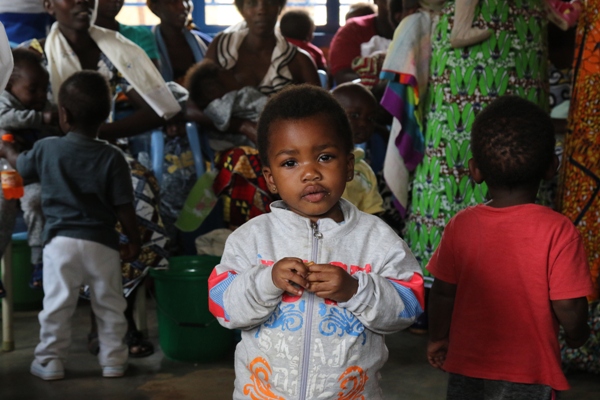
WFP/Emily Fredenberg, WFP nutrition centre in Kiziba camp.
Kigali: The United Nations World Food Programme (WFP) today welcomed a US$5.5 million contribution from the United States of America to provide life-saving food and nutrition assistance to over 138,000 Burundian and Congolese refugees and asylum seekers in Rwanda.
This is in addition to US$3.5 million received in November 2019 at a critical time that allowed WFP to ensure continued assistance to all refugees in the country and avoid ration reductions.
“We’re extremely grateful for the USA’s long-standing support to help disadvantaged women, children and men who have found refuge in Rwanda,” said Edith Heines, WFP Rwanda Representative and Country Director.
“This generous contribution will enable WFP to continue its programmes supporting food and nutrition security for refugees, which also benefits host Rwandan communities by stimulating local markets and creating jobs.”
Camp-based refugees in Rwanda have limited livelihood opportunities. According to a recent joint assessment mission conducted by the Rwandan Ministry of Emergency Management, the UN refugee agency and WFP, more than 80 percent of refugees’ income is derived from food and cash assistance, because of the limited income-generating opportunities available.
The majority of WFP food assistance to refugees in Rwanda is provided through cash-based transfers. This enables refugees to purchase the food of their choice at markets within or around camps and helps improve their dietary diversity.
A study by researchers from WFP and the University of California, Davis in 2016 provided evidence that assistance for refugees has a positive effect on the local economy where they live – an effect that is magnified significantly when the refugees’ food assistance comes in the form of cash.
The study found that refugee spending substantially boost incomes in local communities. For every US dollar of cash transferred by WFP, individual incomes in and around the camps increase by 150 percent to 195 percent annually. This is because there is an added need for goods and supplies from both community and refugee households.
In addition to cash-based transfers, the latest US contribution will enable WFP to provide specialized nutritious foods for the treatment of moderate acute malnutrition for children under five years of age and for the prevention of malnutrition for children aged six months to two years of age and pregnant and breastfeeding women.
Refugee and host community children attending school in and around refugee camps will be provided with porridge each school day to reduce dropout rates and increase their school attendance. Approximately 50 percent of the food provided to refugees with this support will be locally sourced.
The United Nations World Food Programme (WFP) is the world’s largest humanitarian organization, saving lives in emergencies, building prosperity and supporting a sustainable future for people recovering from conflict, disasters and the impact of climate change. (End)
